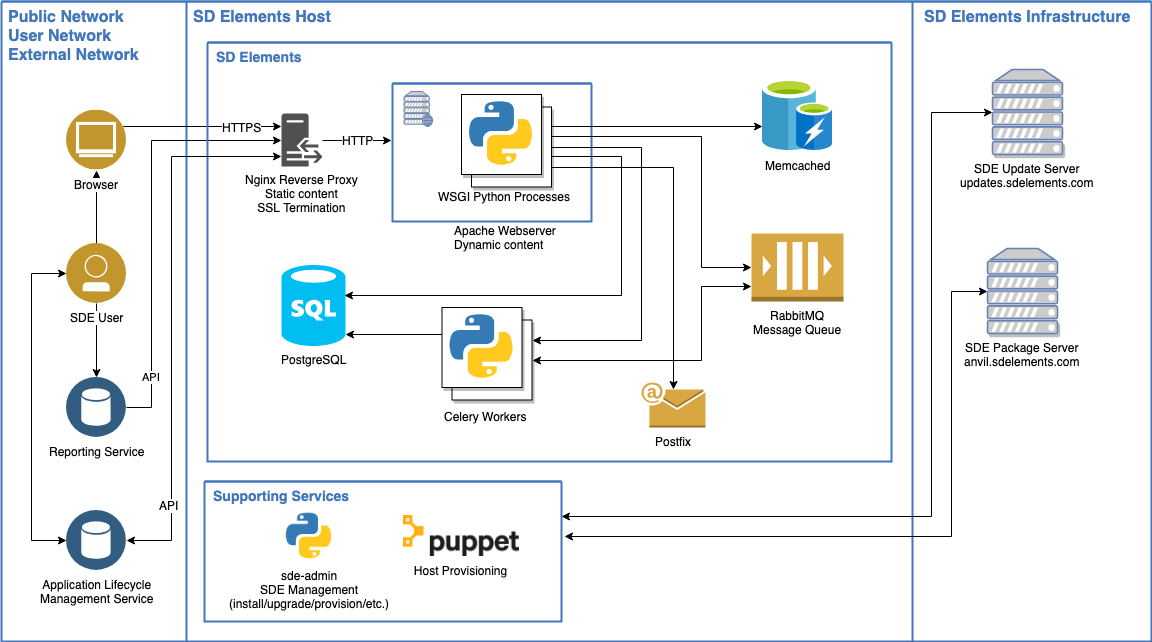-
Standard way to manage the server and perform upgrades
Virtual Machine (VM) deployment overview (Legacy)
| As of SD Elements 2024.2, the container deployment is the only deployment model offered for self managed instances of SD Elements. See the Container Migration Guide for information on migrating your VM instance to a Kubernetes and the Container Deployment section for documentation on installing and maintaining an SD Elements container deployment. |
SD Elements was deployed as a virtual machine and managed using a combination of SSH console and web browser. Virtual Machine (VM) deployment is no longer offered.
The guest virtual machine ran CentOS Linux with SELinux enabled. It was configured with strict controls to meet the security demands of government and enterprise organizations.
Virtual machine prerequisites
The SD Elements virtual machine had the following requirements:
-
VMWare ESXi 4.1 or more recent
-
Minimum 8 GB memory
-
At least 4 CPU cores
-
Minimum 100 GB of disk space
-
One Static Internal version 4 IP address
-
DNS name (e.g. sde.intranet.example.com)
-
TLS/SSL Certificate recognized and trusted by browsers (OpenSSL/Apache compatible format)
-
IPv4 inbound ports:
-
TCP port 80 (HTTP) (only used for redirect to port 443 during initial connection)
-
TCP port 443 (HTTPS)
-
TCP port 22 (SSH) for maintenance/management
-
-
IPv4 outbound ports:
-
TCP port 25 (SMTP) to a relay server for sending email
-
TCP port 443 ( Updates, patches and integrations with Issue Trackers or SAML authentication), at the very minimum the system needs access to
updates.sdelements.com(application) andanvil.sdelements.com(system/OS) -
TCP port 389/636 for LDAP/LDAPS if LDAP authentication is used
-
Required skills
An SD Elements administrator should be comfortable with the following concepts and skill-sets:
-
TCP/IP networking
-
Linux Administration
-
Single Sign-on solutions like LDAP and SAML.
Components
The SD Elements server is composed of the following major components:
| Name | Process name | Purpose |
|---|---|---|
sde |
sde |
|
Nginx |
nginx |
|
Apache |
httpd |
|
PostreSQL |
postgres |
|
Celery |
celery |
|
RabbitMQ |
rabbitmq |
|
Cron |
|
|
Python |
python |
|
Puppet |
puppet |
|
Postfix |
postfix |
|
sde_admin |
|
|
sdetools |
|
Log files
Files stored in /docs/sde/log generally track the application events associated
with SD Elements. Other system processes that run on the server store their
logs according to the default CentOS location, typically /var/log/.
In the table below VERSION denotes the application version; for example 4.14.
|
| Component | File | Scope |
|---|---|---|
SD Elements web application |
/docs/sde/log/sdlc.log |
Main source of application logs |
SAML support |
/docs/sde/log/saml.log |
SAML incoming requests |
Celery |
/docs/sde/log/celery/celery_docs_sde_VERSION.log |
Logs for integration (Issue Tracker, scanner tools) and email jobs. |
Nginx |
|
|
Apache |
|
|
sde |
/docs/sde/log/deploy.log |
Logs collected during upgrades |
LDAP |
/docs/sde/log/ldap.log |
Contains LDAP logs |
Notable system files
| File | Purpose |
|---|---|
|
Custom application settings that survive upgrades. These override and extend core application settings |
|
Contains username, password and URL location for downloading SD Elements updates. |
|
A YAML file of custom settings used to configure the server. See Supported
system configuration for the list of available settings. The settings are applied
after each upgrade or when |
Supported system configuration
The system can be configured with a wide array of settings and options that are correlated during upgrades or when sde reprovision is run. For a complete list of officially supported options, see /etc/sde/custom.yaml.example. A sample of options is provided below.
Any other system configuration changes may be lost or overwritten when the system is reprovisioned or during an upgrade.
| Name | Settings |
|---|---|
NTP time service |
ntp::enable: - true ntp::restrict: - 127.0.0.1 ntp::autoupdate: false ntp::servers: - 0.us.pool.ntp.org iburst - 1.us.pool.ntp.org iburst - 2.us.pool.ntp.org iburst - 3.us.pool.ntp.org iburst |
The SD Elements activation key for access to update repositories for subscription-manager (supplied by SD Elements Support) |
role::sdelements_server::activation_key: 'Acme-rhel7-81ab92bb-54ff-4aaaa-9122-ab4ac1e1241e' |
Application Server TLS/SSL |
role::sdelements_server::ssl_key: '/etc/apache2/ssl/apache.key' role::sdelements_server::ssl_cert: '/etc/apache2/ssl/apache.crt' |
Custom certificates |
role::server::custom_ca_certs: '/etc/sde/custom_ca_certs/' |
Manage firewall |
role::server::manage_firewall: false # Add firewall rules to iptables to open custom ports #profile::managed_firewall::custom_ports: # - 8099 # - 8299 |
Log rotation |
role::server::manage_logrotate: false |
Server admin email |
role::sdelements_server::admin_email: 'support@sdelements.com' |
SSH daemon |
sshd::permit_root_login: 'no' sshd::password_authentication: 'no' sshd::kerberos_authentication: 'no' sshd::gssapi_authentication: 'no' sshd::agent_forwarding: 'no' sshd::tcp_forwarding: 'no' |
Update configuration |
profile::sde_instance::instance_upgrade_user: <username> profile::sde_instance::instance_upgrade_password: <supersecret> profile::sde_instance::instance_upgrade_url: 'https://update.sdelements.com/sde/prod/4/' |
Application worker processes |
profile::sde_instance::wsgi_processes: 4 profile::sde_instance::wsgi_threads: 2 profile::sde_instance::wsgi_threads: 1 profile::sde_instance::wsgi_threads: 1 profile::sde_instance::wsgi_batch_processes: 2 profile::sde_instance::wsgi_batch_threads: 1 profile::sde_instance::wsgi_batch_priority: 20 |
Webserver settings |
sde::instance::sde_admin_apache_vhost_port: 8099 |
TLS/SSL Config |
sde::instance::ssl_protocols: TLSv1.2, TLSv1.3 sde::instance::ssl_ciphers: ECDHE-RSA-AES128-GCM-SHA256:ECDHE-ECDSA-AES128-GCM-SHA256 |
Nginx worker processes |
nginx::worker_processes: 4 |
Apache mod_rewrite |
# Enable and configure Apache mod_rewrite rules.
# See: https://httpd.apache.org/docs/current/mod/mod_rewrite.html
profile::sde_instance::apache_rewrites:
- comment: 'Always send back a 204 for OPTIONS'
rewrite_cond:
- "%{literal('%')}{REQUEST_METHOD} OPTIONS"
rewrite_rule:
- '^(.*)$ $1 [R=204,L]'
|
CORS Support |
# The following Apache headers are configurable to support Cross-Origin Resource # Sharing (CORS). 'Access-Control-Allow-Headers' and 'Access-Control-Allow-Methods' # are added with default values (below) if 'Access-Control-Allow-Origin' is set # - Access-Control-Allow-Origin # - Access-Control-Allow-Headers # - Access-Control-Allow-Methods # # Defaults: #profile::sde_instance::apache_ac_allow_origin: null #profile::sde_instance::apache_ac_allow_headers: 'authorization' #profile::sde_instance::apache_ac_allow_methods: 'POST, GET, HEAD' profile::sde_instance::apache_ac_allow_origin: 'https://cors.example.com/' profile::sde_instance::apache_ac_allow_headers: 'authorization' profile::sde_instance::apache_ac_allow_methods: 'POST, GET, HEAD' |
Email relay server |
postfix::server::relayhost: mail.example.com |
DNS servers and settings |
classes: - '::resolv_conf' resolvconf::nameservers: - '198.51.100.1' - '198.51.100.2' resolvconf::searchpath: - 'subdomain1.example.com' - 'subdomain2.example.com' resolvconf::domain: - 'example.com' |
Custom cron jobs |
cron::job:
'first_job':
command: '/bin/echo "This is run as root every 12 hours"'
hour: '*/12'
mode: '0644'
'second_job':
command: '/bin/echo "This is run as puppet every 12 hours"'
hour: '*/12'
mode: '0644'
user: puppet
'once_a_day':
command: '/bin/echo "Today is $(/bin/date)"'
interval: 'daily'
environment:
- 'MAILTO=root'
# Another variation of cron::job
cron::job::weekly:
'weekly_job':
command: '/usr/bin/echo "I run weekly"'
minute: 0
hour: 0
weekday: 0
|
SD Elements VM architecture

